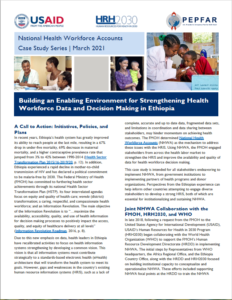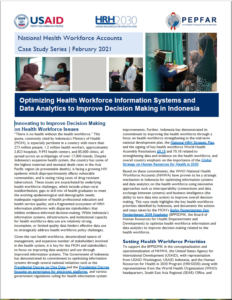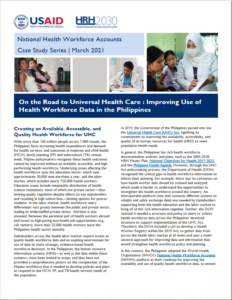31 Mar Case Study Series: Supporting National Health Workforce Accounts in Ethiopia, Indonesia, and the Philippines
To achieve universal health coverage, national policymakers need complete, accurate data about the health workforce. Recognizing this, the World Health Organization (WHO) developed the National Health Workforce Accounts (NHWA) to standardize sources of countries’ health workforce information and improve their interoperability. Beginning in 2016, HRH2030 collaborated with USAID, PEPFAR, and WHO to develop effective, adaptable approaches to assist low- and middle-income countries with NHWA. Specific activities included working with stakeholders in Ethiopia, Indonesia, and the Philippines to develop tools and governance structures that these countries could use to conceptualize and operationalize NHWA. As HRH2030 wraps up its final year of implementation, the program has developed a case study series looking at each of these country experiences.
 In Ethiopia, HRH2030 has worked with the Federal Ministry of Health (FMOH)’s Human Resources Development Directorate (HRDD) and USAID Ethiopia to address weaknesses in the HRIS and develop processes for NHWA implementation. This concise, six-page study, Building an Enabling Environment for Strengthening Health Workforce Data and Decision Making in Ethiopia, examines how the FMOH engaged stakeholders from across the health labor market to prioritize information needs, created a NHWA governance structure, and began working on revitalizing its HRIS to overcome the barriers to collecting and using quality data.
In Ethiopia, HRH2030 has worked with the Federal Ministry of Health (FMOH)’s Human Resources Development Directorate (HRDD) and USAID Ethiopia to address weaknesses in the HRIS and develop processes for NHWA implementation. This concise, six-page study, Building an Enabling Environment for Strengthening Health Workforce Data and Decision Making in Ethiopia, examines how the FMOH engaged stakeholders from across the health labor market to prioritize information needs, created a NHWA governance structure, and began working on revitalizing its HRIS to overcome the barriers to collecting and using quality data.
 In Indonesia, HRH2030 has worked with the Board of Human Resources for Health Empowerment and Development (BPPSDMK) and USAID Indonesia to develop a digital ecosystem of health workforce stakeholders and systems to improve the availability and quality of data for use by all health system decision makers. This concise, six-page study, Optimizing Health Workforce Information Systems and Data Analysis to Improve Decision Making in Indonesia, examines the Indonesian government’s health workforce priorities, how the BPPSDMK, HRH2030, and partners worked to improve existing information sources to facilitate NHWA—including strengthening the human resource information system, engaging stakeholders across the health labor market, and building human capacity for using and managing data.
In Indonesia, HRH2030 has worked with the Board of Human Resources for Health Empowerment and Development (BPPSDMK) and USAID Indonesia to develop a digital ecosystem of health workforce stakeholders and systems to improve the availability and quality of data for use by all health system decision makers. This concise, six-page study, Optimizing Health Workforce Information Systems and Data Analysis to Improve Decision Making in Indonesia, examines the Indonesian government’s health workforce priorities, how the BPPSDMK, HRH2030, and partners worked to improve existing information sources to facilitate NHWA—including strengthening the human resource information system, engaging stakeholders across the health labor market, and building human capacity for using and managing data.
 In the Philippines, HRH2030 has worked with the Department of Health (DOH) Health Human Resources Development Bureau (HHRDB) and USAID to develop and implement a road map that conceptualizes, operationalizes, and plans for the sustainability of NHWA. This concise, six-page study, On the Road to Universal Health Care: Improving Use of Health Workforce Data in the Philippines, looks at the country’s health workforce priorities, how the DOH addressed the fractured nature of data management, and the importance of developing a strong governance structure as well as aligning policy priorities to advance progressive implementation of the NHWA.
In the Philippines, HRH2030 has worked with the Department of Health (DOH) Health Human Resources Development Bureau (HHRDB) and USAID to develop and implement a road map that conceptualizes, operationalizes, and plans for the sustainability of NHWA. This concise, six-page study, On the Road to Universal Health Care: Improving Use of Health Workforce Data in the Philippines, looks at the country’s health workforce priorities, how the DOH addressed the fractured nature of data management, and the importance of developing a strong governance structure as well as aligning policy priorities to advance progressive implementation of the NHWA.
Country: Ethiopia, Indonesia, Philippines
Resource Type: Case Study, Other
Topic: HRIS and health workforce data; Leadership and governance





